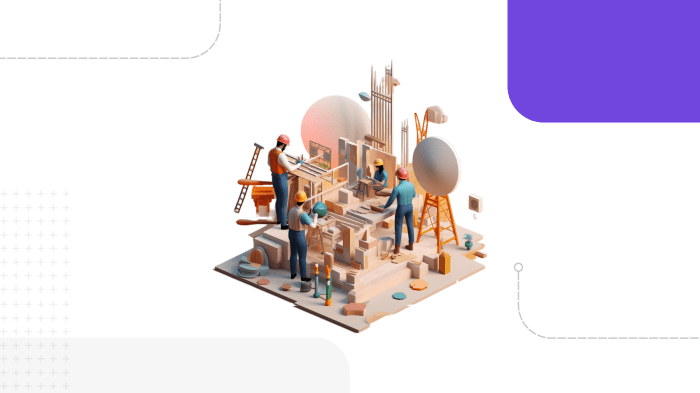5 Ways Construction Tech Founders Can Win in 2024: The construction industry is undergoing a digital revolution, and tech-savvy founders are at the forefront of this exciting transformation. From leveraging data analytics to embracing emerging technologies, there are numerous opportunities for construction tech founders to make a significant impact in 2024 and beyond.
This article explores five key strategies that can help construction tech founders succeed in the rapidly evolving landscape. We’ll delve into the power of data, the potential of emerging technologies like AI and VR, the importance of collaboration and partnerships, the growing demand for sustainability, and the need for user-friendly and accessible solutions.
Embrace the Power of Data
Construction tech founders can gain a significant competitive edge by leveraging the power of data analytics. Data-driven insights can optimize project efficiency, reduce costs, and enhance decision-making throughout the construction lifecycle.
Data-Driven Insights for Construction Projects
Data analytics can be applied to various aspects of construction projects, providing valuable insights for informed decision-making. Here are some examples:
- Scheduling Optimization: By analyzing historical data on project timelines, weather patterns, and resource availability, construction tech founders can develop more accurate and efficient project schedules. This can help identify potential delays, optimize resource allocation, and minimize project costs.
- Resource Allocation: Data analysis can help optimize resource allocation by identifying patterns in material usage, labor requirements, and equipment utilization. This allows construction tech founders to allocate resources more effectively, minimizing waste and maximizing efficiency.
- Risk Management: Analyzing historical data on project risks, such as weather events, labor shortages, and material price fluctuations, can help construction tech founders identify potential risks and develop mitigation strategies. This proactive approach can minimize project delays and cost overruns.
Data Security and Privacy
Data security and privacy are crucial considerations for construction tech founders. It is essential to implement robust security measures to protect sensitive data, such as project plans, financial information, and personal data of employees and clients. Compliance with industry regulations, such as GDPR and CCPA, is also essential to ensure data privacy and protect the company from legal liabilities.
Leverage Emerging Technologies
Construction technology is rapidly evolving, and founders who embrace emerging technologies will be best positioned to succeed in 2024. These technologies have the potential to revolutionize the industry, improving efficiency, safety, and sustainability.
Artificial Intelligence (AI)
AI is transforming construction by automating tasks, optimizing processes, and providing insights that were previously impossible.
- Predictive Analytics: AI can analyze vast amounts of data to predict potential problems, such as delays or cost overruns, allowing for proactive mitigation strategies.
- Construction Robotics: Robots are being used for tasks such as bricklaying, welding, and painting, increasing efficiency and reducing labor costs. For example, the company BrickBot has developed a robot that can lay bricks at a rate of 3,000 bricks per hour, significantly faster than human workers.
- Computer Vision: AI-powered computer vision systems can be used to monitor construction progress, identify safety hazards, and track materials, improving efficiency and safety.
Robotics
Robotics is another rapidly developing field with the potential to revolutionize construction.
- Construction Robots: Robots are being used to perform a variety of tasks on construction sites, such as demolition, excavation, and welding. For example, the company Spot by Boston Dynamics has developed a robotic dog that can be used to inspect construction sites and identify potential hazards.
- Exoskeletons: Exoskeletons can enhance the strength and endurance of construction workers, reducing fatigue and injuries. For example, the company Ekso Bionics has developed an exoskeleton that can help workers lift heavy objects and work for longer periods.
Virtual Reality (VR)
VR is transforming the way construction projects are planned, designed, and built.
- Design Visualization: VR allows architects and engineers to create immersive 3D models of buildings, allowing clients to experience the design before construction begins.
- Construction Simulation: VR can be used to simulate construction processes, identifying potential problems and optimizing workflows. For example, the company Autodesk has developed a VR software that allows construction workers to simulate the construction of a building, identifying potential hazards and optimizing workflows.
- Training and Safety: VR can be used to train construction workers on safety procedures and equipment operation in a safe and controlled environment.
Foster Collaboration and Partnerships
In the fast-paced world of construction technology, collaboration and partnerships are no longer just good practice; they are essential for success. By leveraging the strengths of diverse players, construction tech founders can unlock new markets, accelerate innovation, and achieve greater impact.
Successful Partnerships in Action
Successful partnerships between construction technology companies and traditional construction firms demonstrate the power of collaboration. These partnerships often involve integrating innovative technologies into existing workflows, leading to improved efficiency and productivity.
- Trimble and Skanska: Trimble, a leading provider of construction technology solutions, partnered with Skanska, a global construction and development company, to implement a comprehensive BIM (Building Information Modeling) solution. This partnership enabled Skanska to streamline project planning, improve coordination, and reduce waste, resulting in significant cost savings and project delivery improvements.
- Autodesk and Bechtel: Autodesk, a renowned software company, collaborated with Bechtel, a global engineering, construction, and project management firm, to develop a cloud-based platform for managing construction projects. This platform allowed Bechtel to enhance collaboration among project teams, improve communication, and gain real-time insights into project progress.
Creating an Ecosystem of Interconnected Technologies and Services
Building an ecosystem of interconnected technologies and services is a key strategy for construction tech founders. By collaborating with other technology providers, construction tech companies can offer comprehensive solutions that address a wider range of challenges and needs.
“The future of construction technology lies in creating an interconnected ecosystem where different technologies and services seamlessly work together.”
- Integration with Existing Systems: Construction tech companies can collaborate with software providers to ensure seamless integration with existing enterprise resource planning (ERP) systems, project management tools, and other essential software used by construction firms. This integration eliminates data silos and allows for smoother information flow across different platforms.
- Joint Marketing and Sales Efforts: Partnerships can facilitate joint marketing and sales efforts, reaching a broader audience and expanding market reach. By leveraging each other’s expertise and customer networks, construction tech companies can effectively promote their solutions to a wider range of potential clients.
Prioritize Sustainability and Environmental Responsibility: 5 Ways Construction Tech Founders Can Win In 2024
The construction industry has a significant environmental footprint, and in 2024, it’s no longer an option to ignore the call for sustainability. Consumers, investors, and even governments are increasingly demanding eco-friendly construction practices, and tech founders who embrace this trend will gain a competitive edge.
The Growing Demand for Sustainable Construction Practices
The demand for sustainable construction is fueled by a growing awareness of the environmental impact of the built environment. Buildings account for a significant portion of global energy consumption and greenhouse gas emissions. The construction process itself generates waste and consumes resources. This has led to a surge in demand for green building practices, including:
* Energy efficiency: Using materials and technologies that minimize energy consumption in buildings.
* Water conservation: Implementing strategies to reduce water usage in construction and building operations.
* Waste reduction: Minimizing waste generation during construction and finding innovative ways to recycle and reuse materials.
* Material sourcing: Choosing sustainable materials with low environmental impact and prioritizing recycled and renewable resources.
Examples of Innovative Technologies for Sustainable Construction, 5 ways construction tech founders can win in 2024
Construction tech founders are leading the charge in developing innovative solutions that reduce the environmental impact of construction projects. Here are some examples:
* Building Information Modeling (BIM): BIM software can be used to optimize building designs for energy efficiency and minimize material waste.
* Prefabrication: Off-site construction using prefabricated components reduces waste, improves efficiency, and minimizes on-site disruption.
* Green building materials: New technologies are being developed to create sustainable building materials from recycled waste, bio-based materials, and other innovative sources.
* Solar energy integration: Integrating solar panels into building designs provides a renewable energy source and reduces reliance on fossil fuels.
* Smart building technologies: Utilizing sensors and data analytics to optimize building performance and minimize energy consumption.
Positioning Construction Tech Founders as Leaders in Sustainable Building
Construction tech founders can position themselves as leaders in sustainable building by:
* Developing technologies that address key sustainability challenges: Focusing on solutions that directly reduce the environmental impact of construction projects.
* Partnering with sustainable building organizations: Collaborating with organizations like the U.S. Green Building Council (USGBC) to promote and implement sustainable practices.
* Promoting transparency and accountability: Sharing data on the environmental impact of their technologies and projects to build trust with stakeholders.
* Educating the construction industry: Sharing knowledge and best practices to encourage widespread adoption of sustainable construction methods.
Focus on User Experience and Accessibility
In the construction industry, where technology is rapidly transforming workflows and processes, focusing on user experience and accessibility is paramount. Creating user-friendly and inclusive construction technologies is not just about making them easy to use; it’s about ensuring that they benefit all stakeholders, from architects and engineers to contractors and end-users. By prioritizing accessibility, construction technology companies can unlock new markets, foster wider adoption, and drive greater innovation.
User-Friendly Interfaces and Intuitive Designs
Construction technologies should be designed with user-friendliness in mind. This means creating intuitive interfaces, simplifying complex processes, and providing clear and concise instructions. User-friendly interfaces reduce training time, minimize errors, and increase user satisfaction.
- Simplified Project Management Platforms: Project management platforms that are intuitive and easy to navigate can streamline communication, track progress, and manage resources efficiently. They should allow users to easily input data, access real-time updates, and generate reports without requiring extensive technical expertise.
- VR and AR for Design Visualization: Virtual reality (VR) and augmented reality (AR) tools can be incredibly valuable for visualizing designs and facilitating communication between stakeholders. They can create immersive experiences that allow users to explore and interact with 3D models, providing a deeper understanding of the project and identifying potential issues early on.
Accessibility for All Stakeholders
Construction technologies should be accessible to all stakeholders, regardless of their technical expertise or physical abilities. This includes providing options for users with disabilities, ensuring that interfaces are adaptable to different languages and cultures, and offering support for diverse user needs.
- Accessible Mobile Apps: Construction apps should be designed to be accessible on mobile devices, allowing users to access information and manage tasks on the go. This is particularly important for field workers who may not have access to desktop computers.
- Multilingual Support: Construction projects often involve teams from different countries and cultures. Technology should be designed to support multiple languages, ensuring that everyone can understand and utilize the tools effectively.
- Adaptive Interfaces: Interfaces should be adaptable to different user preferences and abilities. This includes providing options for users with visual impairments, such as screen readers, and ensuring that the design is responsive to different screen sizes and resolutions.
By embracing these five strategies, construction tech founders can position themselves as leaders in the industry, driving innovation, improving efficiency, and creating a more sustainable future for construction. The future of construction is bright, and tech founders have the power to shape it. Are you ready to win in 2024?
From embracing AI-powered project management to leveraging the power of the metaverse for virtual site walkthroughs, there are plenty of ways construction tech founders can win in 2024. It’s a good reminder that while tech giants like Tesla face their own challenges, like the recent tesla requests pause in federal racial bias lawsuit as it wraps up other cases , the construction tech landscape is ripe for innovation and disruption.
With a focus on efficiency, sustainability, and worker safety, construction tech founders have the potential to shape the future of building and infrastructure.
 Standi Techno News
Standi Techno News

